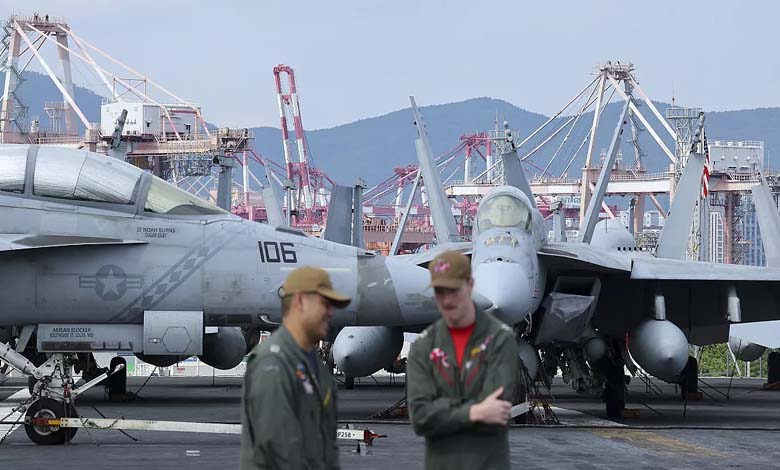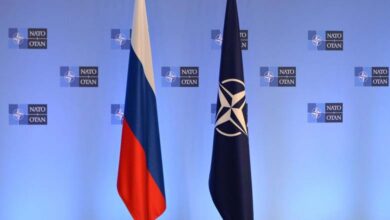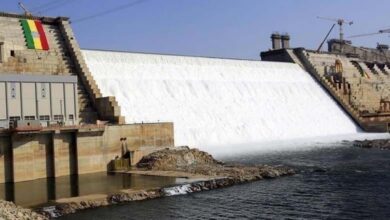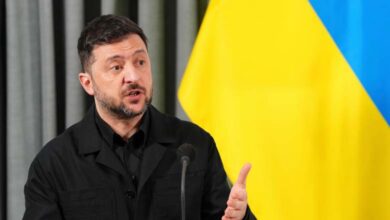World War Preparations? Europe’s Weapons Stuck on the Rails

The disaster scenario, where Russian and European military forces collide in an all-out war, occupies the minds of decision-makers on both sides.
As much as the conflict in Ukraine since February 2022 has fueled the chances and possibilities of such a direct confrontation, it has also exposed several glaring flaws and gaps in Europe’s defense system, according to the American magazine “Politico.”
According to a high-ranking French general, if Europe wants to deter any potential Russian attack, it must do a much better job of transporting tanks, troops, and ammunition across the continent.
General Bertrand Taugoo, in charge of the newly established French army’s land command in Europe, stated that “countries were accustomed during the Cold War to moving military equipment across the continent, a task that was ‘very simple’ at that time but has become ‘increasingly complex.'”
Taugoo added, speaking from his office in Lille, that it is “extremely necessary to bring military mobility back to the European mind, and for that, we need to practice it.”
Obstacles
In theory, if Russia were to attack a nearby NATO member country, European and American troops would need to reach the alliance’s eastern flank as quickly as possible.
However, current obstacles to rapid movement include lengthy and fragmented administrative procedures for transferring military equipment across borders, inadequate infrastructure, including bridges and tunnels, for transporting armored vehicles, and a shortage of transport capacities such as railway cars.
In May, European Union foreign ministers urged European capitals to implement the bloc’s military mobility commitment, which includes obligations to invest in infrastructure and to prioritize land, rail, and other transport means for the armed forces.
A month later, France announced it would join an agreement already signed by Poland, Germany, and the Netherlands to create a military transit corridor. Greece, Bulgaria, and Romania then signed a letter of intent to cooperate in cross-border military mobility.
Romania’s Secret
According to “Politico,” the French military painfully realized the difficulty of crossing Europe in the spring of 2022 when it deployed a battalion to Romania in response to the Russian attack on Ukraine.
Taugoo said in this context, “We discovered how complex the administrative routine is. There is a war in Ukraine, but customs officials tell us that we have exceeded the appropriate load, and our tanks are not allowed to cross Germany… It’s unbelievable.”
Beyond administrative burdens, soldiers were struggling with a decline in the basic skills required for rapid troop and equipment transfer across the European continent.
The French general noted that his army—which has spent the past decades fighting in Afghanistan and the Sahel region of West Africa—”hasn’t loaded military equipment onto trains for about 20 years.”
Additionally, railway station managers at SNCF, the French national railway company, lack the necessary information and skills in this regard.
Taugoo concluded, “We are going back to something we knew how to do and have completely forgotten.”
Problems and Solutions
France deployed its forces in Romania as part of NATO’s broader efforts to bolster its eastern defenses and hopes to use regular rotations of troops and equipment to relearn the art of military transport.
Taugoo acknowledged that improving military mobility would not be easy as transport and customs rules are largely within the national jurisdiction of member states.
The French general stated, “You are frankly attacking national sovereignty when dealing with sensitive issues like who can cross, customs fees, and what types of weapons can be on board.”
-
“The Deadly Lake”.. The Ghost of the Cold War Haunts a Russian Region
-
“Nuclear Doctrine”… Russia Hints at a “World-Threatening” Amendment
Taugoo wants European policymakers to focus first on rail transport. He explained that “rail remains by far the most practical way” to transport equipment.
One idea is to lower rail transport fees. Taugoo noted that currently, the French military has to pay 30 million euros annually to ensure round-the-clock access to trains, adding, “We hope to secure train access without being obliged to pay.”
He concluded that “France also needs to upgrade its transport infrastructure.”












